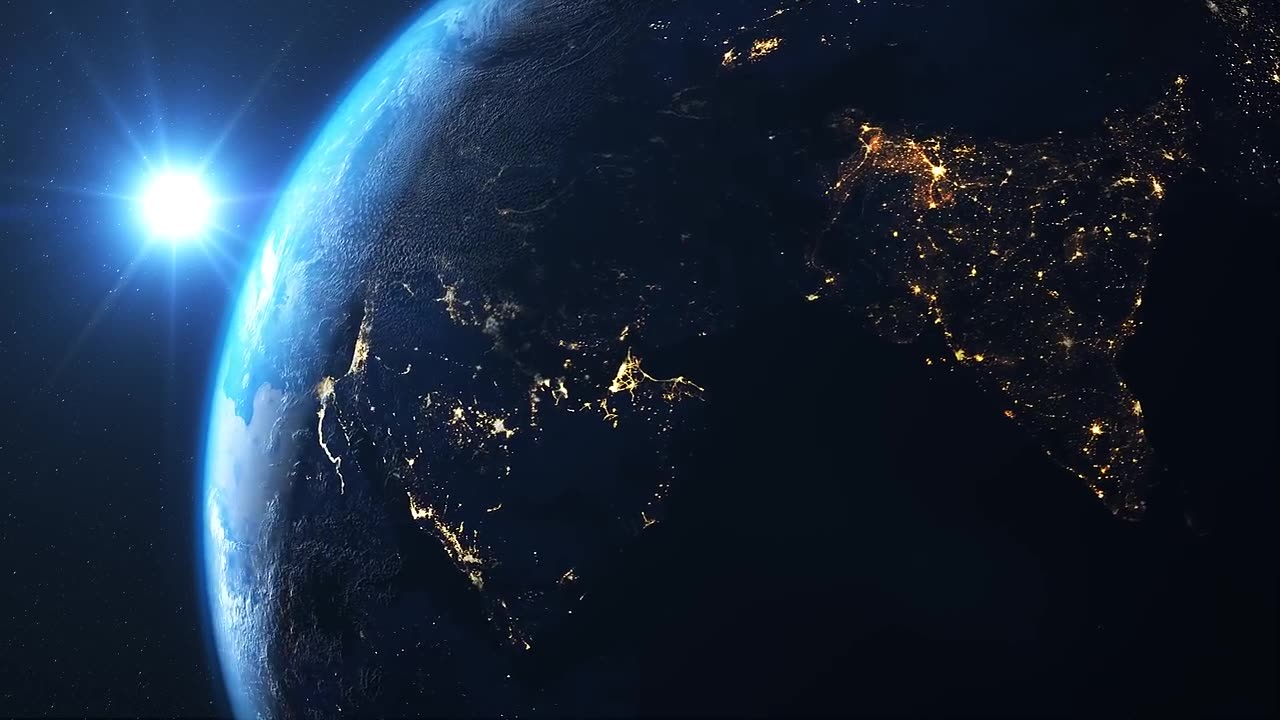Premium Only Content

Planet Earth Spinning in Space Free
Planet Earth is indeed spinning in space, and this rotation is responsible for the day and night cycle we experience on the surface. Here are some key points about Earth's rotation in space:
1. **Rotation Direction:** Earth rotates counterclockwise when viewed from above the North Pole. This rotation is commonly referred to as "eastward" or "from west to east."
2. **Speed of Rotation:** The speed of Earth's rotation varies depending on your location on the planet. Near the equator, the rotational speed is approximately 1670 kilometers per hour (1037 miles per hour). As you move towards the poles, this speed decreases.
3. **Axis of Rotation:** Earth's rotation occurs around an imaginary line called the "axis of rotation," which runs from the North Pole to the South Pole. This axis is tilted at an angle of approximately 23.5 degrees relative to its orbit around the Sun. This tilt is responsible for the changing seasons on Earth.
4. **Day and Night Cycle:** Earth's rotation causes the alternating cycle of day and night. As the planet rotates, different parts of its surface are exposed to the Sun's light (daytime) and in shadow (nighttime). The duration of daylight and darkness depends on your location and the time of year.
5. **Effects of Rotation:** Earth's rotation has several important effects, including the creation of the Coriolis effect, which influences atmospheric and oceanic circulation patterns, and the bulging of the planet at the equator due to centrifugal force.
6. **Stable Rotation:** Earth's rotation is remarkably stable over geological time scales. It is not entirely constant, as it can experience minor variations due to factors like the gravitational influence of the Moon and other celestial bodies. However, these variations are small and generally predictable.
7. **Space Travel:** The rotation of Earth is a critical factor in space travel. Rockets launched from Earth's surface take advantage of this rotational speed to help reach orbit. Launching from near the equator provides an additional boost from Earth's rotational speed.
In summary, Earth's rotation is a fundamental aspect of our planet's existence in space. It's the reason we have day and night, and it plays a crucial role in our climate and the behavior of the atmosphere and oceans. Earth's rotation, along with its orbit around the Sun, is what keeps our planet in constant motion in the vast expanse of space.
-
 9:22
9:22
MattMorseTV
15 hours ago $5.19 earnedINDIA just made a BIG MISTAKE.
53.1K50 -
 12:11
12:11
Nikko Ortiz
14 hours agoCrashout 6 Rumble
5.26K2 -
 22:35
22:35
GritsGG
14 hours agoThe KILO is BACK! The Best AR on Warzone FRIES!
16.2K1 -
 2:16:36
2:16:36
Side Scrollers Podcast
18 hours agoStreamer KICKED OUT of Renaissance Fair for Misgendering + Spiderman MELTDOWN | Side Scrollers Live
35.9K7 -
 12:29
12:29
The Pascal Show
1 day ago $0.65 earnedLOCKED IN A DUNGEON?! Parents Arrested After 5 Children Found In 'Dungeon' At Home
9.96K3 -
 LIVE
LIVE
Lofi Girl
2 years agoSynthwave Radio 🌌 - beats to chill/game to
202 watching -
 3:07:24
3:07:24
FreshandFit
9 hours agoPrivileged Nigerian Thinks Women Created Everything: HEATED DEBATE
141K79 -
 5:57:27
5:57:27
SpartakusLIVE
10 hours agoNEW Update - BROKEN Attachment || Viewers REJOICE at the long-awaited Return of Their KING
74.9K -
 2:06:31
2:06:31
TimcastIRL
9 hours agoTrump To Deploy National Guard To Portland, Antifa Has Been WIPED OUT | Timcast IRL
189K157 -
 2:30:00
2:30:00
Laura Loomer
11 hours agoEP142: Loomer Prompts Calls For FBI To Investigate Palestinian Youth Movement
49.8K20